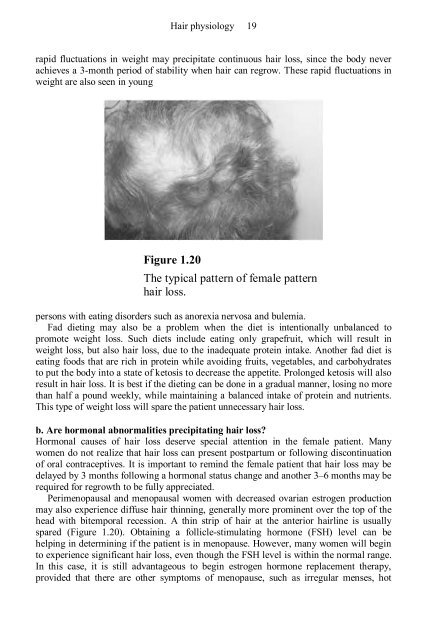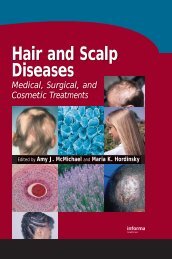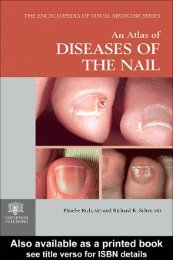- Page 2: Hair Care
- Page 5 and 6: © 2005 Taylor & Francis, an imprin
- Page 8: Foreword Patients expect their derm
- Page 12 and 13: Contents Foreword vii Acknowledgeme
- Page 15 and 16: 1 Hair physiology HAIR STRUCTURE AN
- Page 17 and 18: Figure 1.2 Hair physiology 3 The ap
- Page 19 and 20: Figure 1.4 Hair physiology 5 The ap
- Page 21 and 22: Figure 1.6 The layers of the hair s
- Page 23 and 24: Hair physiology 9 original length.
- Page 25 and 26: Hair physiology 11 Figure 1.13 Afri
- Page 27 and 28: Hair physiology 13 are short. These
- Page 29 and 30: Hair physiology 15 Blond 140,000 Br
- Page 31: Hair physiology 17 a club-shaped pr
- Page 35 and 36: Hair physiology 21 1. Trichorrhexis
- Page 37: Hair physiology 23 42. Olsen EA, De
- Page 40 and 41: Hair care 26 (b) Shampoo is foamed
- Page 42 and 43: Figure 2.2 Hair care 28 Proper Sham
- Page 44 and 45: Shampoos function by employing dete
- Page 46 and 47: Hair care 32 The laureth sulfates a
- Page 48 and 49: Hair care 34 film can also form on
- Page 50 and 51: Normal hair shampoos are designed t
- Page 52 and 53: Hair care 38 Baby shampoos are noni
- Page 54 and 55: Hair care 40 shampoo-induced allerg
- Page 56 and 57: Hair care 42 Improved flexibility L
- Page 58 and 59: • Lipids • Quaternaries • Pol
- Page 60 and 61: Hair care 46 more protein that will
- Page 62 and 63: Figure 2.8 Hair care 48 A hot oil t
- Page 64 and 65: Hair care 50 HAIR DRYING We have di
- Page 66 and 67: Figure 2.11 Hand-held hairdryer tec
- Page 68 and 69: Figure 2.15 Hair care 54 Round brus
- Page 70 and 71: Figure 2.19 Detangling comb. Figure
- Page 72 and 73: Hair care 58 both fracture the hair
- Page 74 and 75: Figure 2.27 Stiff bristle brushes f
- Page 76 and 77: Figure 2.30 A variety of hair-cutti
- Page 78 and 79: Figure 2.36 Hair care 64 Razor blad
- Page 80 and 81: Hair care 66 (b) Hair held tightly
- Page 82 and 83:
(d) Bangs are cut with hair twisted
- Page 84 and 85:
Hair care 70
- Page 86 and 87:
Hair care 72 Black individuals with
- Page 88 and 89:
Hair care 74 Nonelectric styling im
- Page 90 and 91:
Hair care 76 more hair breakage as
- Page 92 and 93:
Figure 2.50 Smooth rollers. Figure
- Page 94 and 95:
of hydrogen bonds and salt linkages
- Page 96 and 97:
Figure 2.57 Hair care 82 An example
- Page 98 and 99:
Hair care 84 34. Okamoto M, Yakawa
- Page 100 and 101:
Hair care 86 95. Slepyan AH. Tracti
- Page 102 and 103:
Hairstyling gel Clear gel polymer R
- Page 104 and 105:
Figure 3.4 Hair care 90 An electron
- Page 106 and 107:
Figure 3.6 Hair care 92 An electron
- Page 108 and 109:
Hair care 94 An example of a commer
- Page 110 and 111:
Hair care 96 OIL SHEEN SPRAY Hairsp
- Page 112 and 113:
Hair care 98 18. Plewig G, Fulton J
- Page 114 and 115:
Hair care 100 Tremendous color vari
- Page 116 and 117:
Figure 4.3 Hair care 102 Pheomelani
- Page 118 and 119:
Semipermanent: vegetable Semiperman
- Page 120 and 121:
Hair care 106 effect in the recent
- Page 122 and 123:
Hair care 108 is dismayed with the
- Page 124 and 125:
Figure 4.10 Hair care 110 The appea
- Page 126 and 127:
Hair care 112 more resistant to sha
- Page 128 and 129:
Hair care 114 Chemistry Permanent h
- Page 130 and 131:
Hair care 116 Nevertheless, some dy
- Page 132 and 133:
Figure 4.15 Hair care 118 The compl
- Page 134 and 135:
Figure 4.20 Hair care 120 The appea
- Page 136 and 137:
Figure 4.22 Hair care 122 The hair
- Page 138 and 139:
Hair care 124 The blond permanent h
- Page 140 and 141:
Figure 4.29 The red permanent hair
- Page 142 and 143:
Hair care 128 The multicolored stra
- Page 144 and 145:
Figure 4.38 Hair care 130 Brown hai
- Page 146 and 147:
Two-step bleaching is actually a co
- Page 148 and 149:
Figure 4.40 Hair care 134 The appea
- Page 150 and 151:
Figure 4.41 A mild hair dye reactio
- Page 152 and 153:
Hair care 138 of eumelanin and pheo
- Page 155 and 156:
5 Permanent hair curling The idea o
- Page 157 and 158:
Permanent hair curling 143 2. Proce
- Page 159 and 160:
Permanent hair curling 145 Figure 5
- Page 161 and 162:
Permanent hair curling 147 mandrels
- Page 163 and 164:
Permanent hair curling 149 Figure 5
- Page 165 and 166:
Permanent hair curling 151 Once the
- Page 167 and 168:
Table 5.1 Permanent waving lotion i
- Page 169 and 170:
Permanent hair curling 155 Figure 5
- Page 171 and 172:
Permanent hair curling 157 companie
- Page 173 and 174:
Permanent hair curling 159 A tight
- Page 175 and 176:
produce the curl is known as the
- Page 177 and 178:
Permanent hair curling 163 Home per
- Page 179 and 180:
Permanent hair curling 165 has been
- Page 181 and 182:
Permanent hair curling 167 REFERENC
- Page 183 and 184:
6 Permanent hair straightening Hair
- Page 185 and 186:
sodium hydroxide. This prevents sca
- Page 187 and 188:
Permanent hair straightening 173 Mi
- Page 189 and 190:
Permanent hair straightening 175 4.
- Page 191 and 192:
Permanent hair straightening 177 Fi
- Page 193 and 194:
Permanent hair straightening 179 Fi
- Page 195 and 196:
Permanent hair straightening 181 ha
- Page 197 and 198:
Panthenol Sodium PCA Cetearyl alcoh
- Page 199 and 200:
Permanent hair straightening 185 Fi
- Page 201 and 202:
Permanent hair straightening 187 ma
- Page 203 and 204:
7 Cosmetic-induced hair loss Dermat
- Page 205 and 206:
Cosmetic-induced hair loss 191 Figu
- Page 207 and 208:
Cosmetic-induced hair loss 193 In a
- Page 209 and 210:
Cosmetic-induced hair loss 195 Figu
- Page 211 and 212:
Cosmetic-induced hair loss 197 The
- Page 213 and 214:
Cosmetic-induced hair loss 199 Hair
- Page 215 and 216:
8 Methods for camouflaging hair los
- Page 217 and 218:
ase Cascades Curled locks of hair o
- Page 219 and 220:
Methods for camouflaging hair loss
- Page 221 and 222:
Methods for camouflaging hair loss
- Page 223 and 224:
Methods for camouflaging hair loss
- Page 225 and 226:
Methods for camouflaging hair loss
- Page 227 and 228:
Methods for camouflaging hair loss
- Page 229 and 230:
Methods for camouflaging hair loss
- Page 231 and 232:
Methods for camouflaging hair loss
- Page 233 and 234:
Methods for camouflaging hair loss
- Page 235 and 236:
Methods for camouflaging hair loss
- Page 237:
Methods for camouflaging hair loss
- Page 240 and 241:
shaving legs, axilla, groin Dry sha
- Page 242 and 243:
Hair care 228 difficulty achieving
- Page 244 and 245:
Hair care 230 2. Select a quality l
- Page 246 and 247:
Hair care 232 2. Be sure that the h
- Page 248 and 249:
Figure 9.5 Hair care 234 A male fac
- Page 250 and 251:
Hair care 236 laser hair removal, f
- Page 252 and 253:
Hair care 238 A variety of needle d
- Page 254 and 255:
10 Tips to maintain healthy hair Is
- Page 256 and 257:
Hair care 242 comb. For this reason
- Page 258 and 259:
Figure 10.4 Hair care 244 Freshly s
- Page 260 and 261:
Hair care 246 within the hair shaft
- Page 262 and 263:
Figure 10.7 Hair care 248 Use of a
- Page 264 and 265:
Hair care 250 In short, one of the
- Page 266 and 267:
Hair care 252 nonliving. (b) Patien
- Page 269:
12 Summary This text has pictoriall
- Page 272 and 273:
pomades 80-81 shampoos 34 bleaching
- Page 274 and 275:
glyceryl monothioglycolate 139 grad
- Page 276 and 277:
negroid hair see Black persons’ h
- Page 278 and 279:
sodium hydroxide in hair straighten







